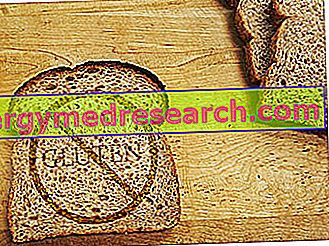Definition
The non-celiac gluten sensitivity is a recently introduced disorder in the medical vocabulary, used to identify all those cases in which a patient manifests symptoms characteristic of celiac disease, and benefits from a gluten-free diet, although it is possible to exclude from medical examinations the presence of celiac disease or wheat allergy.
Therefore, a subject sensitive to gluten manifests the typical symptoms of celiac disease even though they are not affected.

Differences with celiac disease
Celiac disease is a chronic autoimmune disease of the small intestine, which affects genetically predisposed subjects of all age groups.
In celiac patients, the ingestion of gluten-free foods (containing gluten) triggers an intestinal immune response, which damages the mucosa of the small intestine.
This damage gives rise to the typical symptoms of celiac disease, which include abdominal pain, diarrhea and / or chronic constipation, growth retardation (in children), anemia and psychophysical fatigue.
Today we have several non-invasive tests for the diagnosis of celiac disease, which allow us to evaluate the presence or absence of the typical autoimmune response to gluten; these tests are gradually replacing the traditionally considered more reliable test, that is the intestinal biopsy (through a "tube" introduced into the mouth and guided by a camera up to the small intestine, the doctor takes samples of the intestinal mucosa). In order to be able to talk about celiac disease, therefore, the presence of highly suggestive symptoms is NOT enough, but it is always necessary to demonstrate their existence through specific tests. This is a very important aspect, also because sometimes the symptoms of celiac disease are absent or occur in an atypical way.
We can therefore have celiac subjects that do not show intestinal disorders. In the non-celiac gluten sensitivity, on the other hand, exactly the opposite happens, or we have the presence of symptoms suggestive of celiac disease despite - following the tests just seen - it is possible to exclude the presence of the disease (no trace of "anti-gluten antibodies" and no trace of intestinal mucosa lesions).
Generally, gluten sensitivity is a less severe disorder than celiac disease.
Differences with wheat allergy
Wheat allergy is an allergic reaction to wheat proteins. The differences with celiac disease lie in the type of antibodies involved (as well as in the severity of the associated symptoms): while specific autoantibodies against tissue transglutaminase 2 (anti-TG2) are involved in celiac disease, specific IgE antibodies are involved in wheat allergy some of its proteins.
As mentioned, there are also differences in symptoms, given that wheat allergy is characterized above all by disorders affecting the respiratory system (baker's asthma), sometimes with rather violent manifestations (anaphylaxis induced by physical exercise).
The diagnosis of wheat allergy relies mainly on prick tests and specific RASTs.
Symptoms
Non-celiac gluten sensitivity is characterized by intestinal and extra-intestinal symptoms, related to the ingestion of gluten-containing foods. These symptoms may include:
- Abdominal pain and swelling;
- Alve disorders (diarrhea or constipation);
- Dermatitis (eczema and rash with redness and itching);
- Headache and foggy mind;
- Fatigue, with or without muscle-joint pains.
All these symptoms typically disappear with the elimination of gluten from the diet, only to reappear after its reintroduction, usually within hours or a few days.
Gluten sensitivity and irritable bowel syndrome
IBS - better known as irritable bowel syndrome (or colon) - is a gastrointestinal disorder of functional origin (NOT pathological). In order to diagnose its presence it is therefore necessary to first exclude any disease that is potentially responsible for the typical symptoms of IBS, which include chronic diarrhea and / or constipation, abdominal pains and cramps, meteorism and flatulence.
Therefore, although the symptoms are similar, a person with IBS cannot be considered celiac, precisely because this condition must be excluded a priori even before one can speak of IBS.
The theories on the causes of irritable bowel syndrome are different and there is a certain consensus in considering it a multifactorial disorder; it means that different causes of genetic and environmental nature would contribute to the onset. Among these there would also be hypersensitivity to certain substances introduced with food, commonly responsible for food intolerances (gluten, lactose, salicylates, etc.).
The confirmation of this hypothesis derives from the fact that many people with IBS benefit greatly from an exclusion diet, ie without the substances mentioned above.
Based on these considerations, confirmed also by experimental evidence, it is plausible that a certain percentage of people with IBS (around 25-35%) are affected by non-celiac gluten sensitivity. This condition may be present in isolation or in a context of multiple intolerances.
Causes
Since this is a recently defined disorder, several question marks remain about the causes of non-celiac gluten sensitivity.
According to some authors, the non-celiac gluten sensitivity would be the "simple" expression of gastrointestinal distortions (digestive difficulties of different nature and / or dysbiosis) and / or eating disorders. If something does not work perfectly in the digestion of food and / or in the absorption of the nutrients contained in them, the non-absorbed substances are fermented by the intestinal microbial flora, with the production of gas, fatty acids and other substances that can trigger the typical symptoms of IBS and NCGS. In the case of meals that are too abundant and varied, intestinal disorders, chronic caloric surpluses with respect to the body's needs, the share of nutrients not absorbed increases significantly, generating the symptoms listed above. At the same time, due to a loss of selectivity of the intestinal mucosa, there could also be an absorption of potentially sensitizing substances, which under normal conditions would be expelled with the faeces. All this to say that a person considered sensitive to gluten could simply be a person who has been eating "too much and badly" for too long.
More and more molecular characterization studies are attempting to identify markers of the disorder, which however are not always found. The preliminary evidence in this area seems to depict gluten sensitivity as a particular immune reaction congenital to gluten, naturally different from that which gives rise to celiac disease.
Diagnosis
In the course of the article we have seen how in subjects with gluten sensitivity it is not possible to demonstrate the presence of either specific antibodies for celiac disease (or wheat allergy) or the classic intestinal mucosa lesions with villous atrophy (eventually present extremely light).
Currently there are no scientifically recognized international tests specific to the diagnosis of NCGS.
As for IBS, therefore, the diagnosis of non-celiac gluten sensitivity is a diagnosis of exclusion, which is reached after tests for wheat and celiac disease have given a negative result. We also remind you that in order to talk about NCGS it is necessary that the associated symptoms disappear following the adoption of a gluten-free diet and that they reappear following the reintroduction of gluten in the diet. It would also be preferable that such reintroduction took place without the patient being aware of it, so as to exclude a possible placebo effect.
Treatment
Non-Celiac Gluten Sensitivity treatment is based on the adoption of a gluten-free diet for a specific period. It is therefore the same intervention reserved in the presence of celiac disease, with the difference that in the NCGS the suspension of glutinate diets could only be temporary.
Clearly, in addition to this aspect, it is necessary to re-evaluate, with the help of a professional, the nutrition in its entirety, from the food combinations to any intolerances or hypersensitivity, from the contribution of fibers to that of simple sugars, from the consumption of rich foods of additives to water intake. Equally important is the evaluation of certain psychological and behavioral elements, such as the level of physical activity, possible stressors at family or work level and the possible intake of drugs, laxatives, alcohol and drugs.



